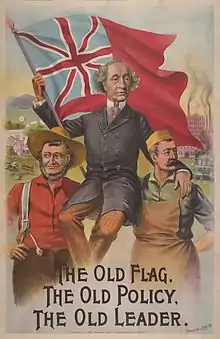Calgary School
The Calgary School is a term used to refer to a group of academics and former students from the University of Calgary's Political Science, Public Policy, Economics, Law, and History departments in Calgary, Alberta, Canada. While many might consider themselves conservative, there are other themes that bind its members. These include support for strong provinces, limits to the power of the federal government, and greater Western influence in Ottawa.

| This article is part of a series on |
| Conservatism in Canada |
|---|
 |
|
|
The term, originally a play on the Chicago school of economics, was coined by American political scientist David Rovinsky.[1]
Members
The school is not an official organization and has no membership list. The first six below were included in the group in an article in The Walrus,[2] the rest in a letter by Tom Flanagan to the Literary Review of Canada:[3]
- David Bercuson, history professor and director of the university's Centre for Military and Strategic Studies.
- Barry F. Cooper, political science professor and fellow of the Canadian Defence and Foreign Affairs Institute.
- Tom Flanagan, professor of political science, senior fellow at the Fraser Institute and former adviser to Conservative Prime Minister Stephen Harper.
- Roger Gibbins, formerly president of the Canada West Foundation (1999-2012) and political science professor at the University of Calgary.
- Rainer Knopff, political science professor.
- Ted Morton, political science professor and former Alberta cabinet minister who finished third in the December 2006 and fourth in the September 2011 leadership race of the province's governing Progressive Conservative party.
- Stephen Harper, Former Prime Minister of Canada and owner of "Harper and Associates" located in downtown Calgary. Mr. Harper also serves as chair of the I.D.U. and was appointed by the present Alberta Premier, Jason Kenney, to serve on the Alberta Economic Recovery Council
- Danielle Smith, former leader of the Wildrose Party.
- Ian Brodie, studied at the University of Calgary and was former Chief of Staff to Stephen Harper.
- Ezra Levant, lawyer, author, founder and former publisher of the Western Standard, hosted The Source daily on Sun News Network.
- Mark Milke, studied at the University of Calgary and is Director of Alberta Policy Studies at the Fraser Institute.https://www.alberta.ca/economic-recovery-council.aspx
- Marco Navarro, studied at the University of Calgary and is a Director of Research at Frontier Centre for Public Policy, Director at Rights and Democracy, Fellow at The Latin American Research Centre, University of Calgary.
- Mercedes Stephenson, studied at the University of Calgary and is a reporter for Global News The West Block.
The school has at times included other academics from the University of Calgary and other universities, many of whom would disagree on important matters of politics and political theory. As well, it is politically and socially connected to others who share a common view of politics, including members of the former Reform Party of Canada, Canadian Alliance party and current federal Conservative Party of Canada.
Political philosophy
The school is politically conservative and has been described in The Walrus as supporting "a rambunctious, Rocky Mountain brand of libertarianism" that seeks "lower taxes, less federal government, and free markets unfettered by social programs such as medicare that keep citizens from being forced to pull up their own socks."[2] Strong provinces and a reduced role for the federal government are seen by some members of the School as a natural corollary of these positions.
There are tensions between the socially conservative and economically conservative factions within the school. Bercuson publicly criticized Morton's social policies, saying "[they] were hard to stomach for a libertarian."[4] Such division brings into question whether its members reflect a coherent "school" of thought.
The members of the school, particularly Flanagan, are also said to be followers of the American political philosopher Leo Strauss, their detractors interpreting this as sharing his "deep suspicion of liberal democracy." Flanagan himself has specifically denied charges that he is a Straussian, calling himself rather a Hayekian, referring to the Nobel Prize–winning economist and political philosopher, Friedrich Hayek.
Influence
While it is always difficult to gauge the impact or influence of such groups, it appears that its members have played a role in the reshaping of Conservative politics in Canada since 1993.
The long dominance of the centrist Liberal Party of Canada at the federal level in Canadian politics was maintained in part during the 1990s by competition between two right wing parties, the older Progressive Conservative Party of Canada and the newer Reform Party of Canada.
Members of the School, notably Flanagan, worked hard to turn the Reform Party into the dominant right wing party and later to encourage a coalition of conservative parties. In December 2003, after a decade of division, he worked on the merger of the Progressive Conservative Party of Canada and the successor to the Reform Party the Canadian Alliance that created the new Conservative Party of Canada. Flanagan played a key role in the development of the new party's platform, helped to build its successful fundraising campaign, and worked on its 2006 election campaign.
The first leader of the new Conservative Party, Stephen Harper (elected in March 2004), and later prime minister, had been a student at the University of Calgary, participating in discussions with members of the School and Preston Manning in the lead up to the formation of the Reform Party. Harper played a role in the development of the Blue Book; which help developed the policies of the Reform Party.[5]
Ted Morton's elevation to the cabinet of the Progressive Conservative government of Alberta and later to the position of finance minister in the Ed Stelmach government and energy minister in the first Alison Redford-led government, is another perceived route of influence for the School.
At the same time, members of the school are involved with the Wildrose Party led by Danielle Smith, with Flanagan working for the party as campaign director for the 2012 provincial election against the Progressive Conservative government.[6] This suggests differences among its members as to how best to pursue any shared political agenda.
In May, 2018, the Canadian Taxpayers' Federation presented their annual "Tax Fighter Award" to four members of the Calgary School—Cooper, Flanagan, Knopff and Morton. See https://www.dropbox.com/s/jmbbqrkmps0gujf/Taxfighter%202018%20v4.mp4?dl=0
Decline
Since the late 2010s, the social science and humanities departments of the University has increasingly drifted away from its historic conservative roots, towards more centrist and progressive themes. In response to the Truth and Reconciliation Commission's report, the Faculty of Arts and the University as a whole, have placed a greater emphasis on indigenous scholarship and education.[7] This has been reflected in the recent appointments of indigenous researchers, as well as the recognition of indigenous politics and law as a research field within the departments of Political Science[8] and Law respectively.[9] Additionally, the Department of Political Science has developed a strong research interest in feminist and gender politics, even considering it a prominent research field.[10] Most recently, faculty members of the Department of Political Science have faced harsh backlash from the Alberta provincial government under Jason Kenney's United Conservatives, criticising the Department for harbouring faculty sympathetic to the Alberta New Democratic Party.[11] A similar trend has been observed in the Department of Economics, where there are prominent figures who are reluctant supporters of carbon pricing as an effective method of achieving climate targets.[12] Researchers in the Department of Economics have even promoted the implementation of a provincial sales tax in Alberta, as a means to prevent drastic austerity policies.[13] The Faculty of Law has also produced two Alberta cabinet ministers under Rachel Notley's New Democratic government, Kathleen Ganley and Irfan Sabir.
Notes
- Rovinsky, David. "The Ascendancy of the West in Canadian Policymaking", Policy Papers on the Americas Vol. IX, Study 2. 16 Feb 1998.
- MacDonald, Marci. "The Man Behind Stephen Harper", The Walrus, October 2004.
- Flanagan, Tom. "Advice to Progressives from the Calgary School", Literary Review of Canada, December 2010.
- McLean, Archie. "Morton would use Alberta as his 'guinea pig': Social, religious views will drive policy, expert says", Edmonton Journal, 2 December 2006.
- McDonald, Marci (2004-10-12). "The Man behind Stephen Harper". The Walrus. Retrieved 2019-11-10.
- Wingrove, Josh. "Tom Flanagan to run Wildrose campaign in Alberta election", The Globe and Mail, January 24, 2012.
- Ii’ taa’poh’to’p, Together in a Good Way: A Journey of Transformation and Renewal (PDF). Calgary: University of Calgary Office of Indigenous Engagement. 2019.
- "Indigenous Politics". University of Calgary Department of Political Science. September 3, 2020.
- "Indigenous Law". University of Calgary Faculty of Law. September 3, 2020.
- "Gender and Politics". University of Calgary Department of Political Science. September 3, 2020.
- Kury de Castillo, Carolyn (December 1, 2019). "Academics sign letter condemning Premier Kenney's comments about University of Calgary professor". Global News.
- Tombe, Trevor (March 2, 2016). "Trevor Tombe: The cheapest way to cut carbon". Financial Post.
- McKenzie, Kenneth J. (October 2, 2019). "Preserving Alberta's advantage means levying a provincial sales tax". Financial Post.